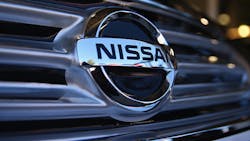Final Countdown: Nissan Introducing Fully Autonomous Cars in 2022
Nissan Motor Co. says it’s aiming to introduce fully autonomous cars to the market in 2022, as the Japanese carmaker strives to establish itself as a front-runner in driverless technologies.
The carmaker plans to add autonomous-driving functions step by step, first allowing more cars to handle single-lane driving by themselves, and subsequently navigate urban roads, including intersections, by 2020, said Yutaka Sanada, a Nissan senior vice president, at Bloomberg’s Year Ahead Asia conference in Jakarta.
Nissan is racing with new entrants to the auto industry such as Google’s Waymo and Tesla Inc., as well as bigger rivals including General Motors Co., to develop fully-autonomous driving cars. Waymo has a clear advantage over auto manufacturers and other tech competitors based on the number of autonomous miles driven, according to Bloomberg New Energy Finance.
In Japan, Nissan models including the Serena minivan, the X-Trail SUV and the new Leaf electric car are gaining popularity because of their semi-autonomous features including single-lane diving and auto parking.
Nissan said Tuesday it will test an autonomous ride-hailing service on public roads in Japan in March, aiming to officially start the “robot taxi” rides in the early 2020s. The carmaker will put two Leaf electric cars, equipped with sensors and cameras and autonomous driving software developed by DeNA Co. The vehicles will ply in a designated part of Yokohama, where Nissan is based. It will seek the general public to participate as passengers, through a booking application on smartphones.
”In Japan we are studying the so-called robot taxi type of activity with government support, and this type of approach may lead to some new findings and new issues, and then we will try to improve it,” Sanada said. ”We want to reinforce collaboration with regulators.”
By Ma Jie
About the Author
Bloomberg
Licensed content from Bloomberg, copyright 2016.
